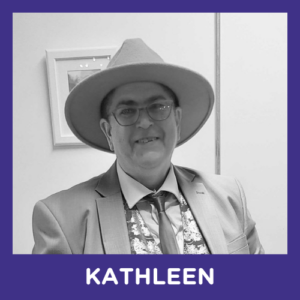Meet Kathleen Conibear, a WCC writer and volunteer facilitator, who currently facilitates workshops in partnership with Mood Disorders Ottawa and The Well. This month, we asked Kathleen to reflect on her experience as a WCC facilitator, the value of our Six Essential Practices, and why she writes.
Q: CAN YOU DESCRIBE HOW YOU GOT STARTED AS A WCC FACILITATOR? WHAT WORKSHOPS DO YOU FACILITATE RIGHT NOW?

KATHLEEN: My first experience attending a WCC workshop was as a result of them being held virtually by a local organization called Mood Disorders Ottawa (MDO). I enjoyed them so much I wanted to become a WCC facilitator as soon as possible. I’m not sure exactly when I started facilitating but I think it was in the fall of 2022.
I’m not sure exactly when I started facilitating but I think it was in the fall of 2022. At the moment, I am only facilitating WCC workshops at MDO and at a woman’s drop-in called The Well. However, soon I will be adding the Centretown Community Health Center to my repertoire, most likely in July.
I have also conducted workshops at Salus, which provides housing and support to those in need, particularly individuals who have mental health challenges. I’m hoping to bring WCC workshops to other venues for which I facilitate, usually in peer-support settings. I would like to be able to provide workshops for the Ontario Caregivers Organization (OCO), Psychiatric Survivors of Ottawa (PSO) and Kindspace; (an LGBTQ+ community centre).
Q: WHEN WE WRITE WITH OTHERS, WE DISCOVER OURSELVES. IN YOUR WCC WORKSHOPS, HOW DO YOU SEE INDIVIDUALS CONNECTING TO THEIR INNATE INNER STRENGTH?
KATHLEEN: I would like to facilitate more WCC workshops [in partnership with peer-support organizations] because the program has had a huge impact on my healing journey, and I’ve seen it become a tremendous benefit to others.
Sometimes the growth of confidence and hope in WCC participants is a slow revelation over a series of workshops, like someone who wants to save the paper while carefully unwrapping a gift.
Time after time, as the client gains positive feedback, they move from skeptical participant to passionate writer. Other times, it’s an amazing “ah-ha” moment as the participant realizes WCC is not about perfection and grammar, but about expression and authenticity evolving from courage and bravery.
Q: MANY SOCIAL AND HEALTH CARE PROFESSIONALS AGREE THAT WE ARE, ACROSS THE WORLD, EXPERIENCING AN EPIDEMIC OF LONELINESS. HOW DOES THE WCC WORKSHOP MODEL WORK TO REDUCE LONELINESS AND ISOLATION?
KATHLEEN: It’s amazing to watch a sense of community pop up, like a crocus in the spring, at a WCC workshop. The process of explaining the purpose and expectations of the workshop, taking time to breathe, and going through the Six Essential practices, establishes the workshop as something beyond a mundane experience. As we write and share, individual participants find they have much in common with the other writers.
The celebration of a writer’s piece via feedback helps the client recognize what they wrote, and what they didn’t write, has been heard. At the very least or perhaps the very most, everyone who writes in a WCC workshop becomes better acquainted with aspects of themselves. All of these elements contribute to a sense of the universality and diversity of human experience which, in turn, contributes to a reduction in isolation and loneliness.
Q: CAN YOU REFLECT ON ONE OF OUR SIX ESSENTIAL PRACTICES AND EXPLAIN THE IMPACT IT HAS IN REDUCING LONELINESS AND ISOLATION?
KATHLEEN: I think of the Six Essential Practices, the one I like the most is the fifth. The fact that the facilitator reads and writes, too, transforms the workshop from a lesson – a top down experience – to a peer experience. When the facilitator is authentic and brave about their piece of writing, the group responds to the emotion, truth, or humour in it. This experience lends hope and courage to the writers to share their writing, too.
Q: IN CELEBRATION OF OUR NEWEST CHAPBOOK, WHY WE WRITE: TEN YEARS OF WCC, WILL YOU SHARE WITH US WHY YOU WRITE?
KATHLEEN: I write because I have mental illness. I suffer from depression. The white noise of negative self-talk paralyzes me and keeps me ruminating in my brain and separated from my heart.
Writing helps me bring down the noise level, allows my dark thoughts to squeeze out of my head and onto the glaring, bright light of the blank page. The thoughts there are just a part of me, have less power over me, and can more easily be challenged.
Once my head is cleared, my heart, my humour, my strengths can be heard again. The joyful part of being alive becomes buoyant like a puppy greeting its person. The joy becomes unignorable, unobscured, and I feel like a greater participant and contributor to humanity.
Thank you, Kathleen, for your courageous work as a community member, peer support, WCC facilitator, and writer. We take great inspiration from you.
